Transition Culture has moved
I no longer blog on this site. You can now find me, my general blogs, and the work I am doing researching my forthcoming book on imagination, on my new blog.
Come find me at robhopkins.net
13 Jul 2011
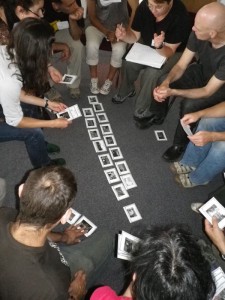 At my workshop at the Transition Network conference I tried out a new teaching tool for Transition initiatives, a deck of cards designed around the ‘Ingredients of Transition’, as set out in the forthcoming ‘The Transition Companion’. On one side of the cards is a photo that captures the spirit of the ingredient and its name, and on the other side is the problem the ingredient is a response to and the solution it represents.
At my workshop at the Transition Network conference I tried out a new teaching tool for Transition initiatives, a deck of cards designed around the ‘Ingredients of Transition’, as set out in the forthcoming ‘The Transition Companion’. On one side of the cards is a photo that captures the spirit of the ingredient and its name, and on the other side is the problem the ingredient is a response to and the solution it represents.
Read more»
12 Jul 2011
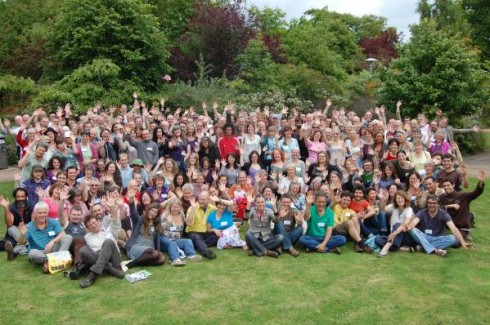
We had a great few days at Hope University in Liverpool. This will not be an attempt at a complete document of that event, you will find the most comprehensive record over at the Transition Network’s conference feed. What I am going to share, with links to some of the key pieces of media from that feed, is some of the notes of my reflections at the end of the conference. As the event drew to a close, I went around and asked people for their brief reflections on what they saw as the character unique to this conference in comparison to others. Three words came up again and again, deepening, focus and maturity.
Read more»
10 Jul 2011
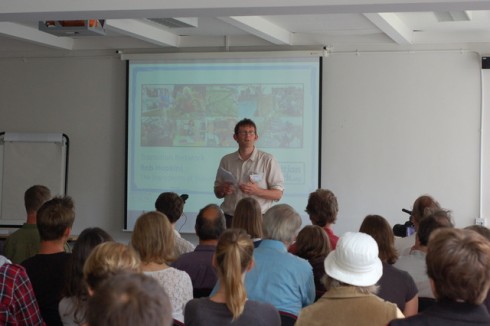
There’s loads of great material being generated over at the Transition Conference blog, but I thought I would put the audio file of my workshop up here for your listening pleasure. The subject of the workshop was the ‘Ingredients of Transition’ which form the bulk of the forthcoming Transition Companion. You can hear the full audio of the talk here. Thanks to Chris for recording it. I didn’t talk for that long though, the bulk of the workshop consisted of two exercises which I’ll write about in more detail in another post. Both gave me some very useful insights into a possible new tool which Transition initiatives could find really useful. More later. It’s been a fantastic event so far….
Read more»
8 Jul 2011
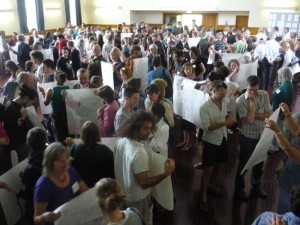
The 'Mapping the Future' event at last year's conference.
It’s that time again. I’m packing my bag and getting ready to head off the Liverpool for the Transition Network conference. It’s going to be fantastic. If you are unable to make it, keep an eye on the Transition Network blog stream for the torrent of blogs and audio files that our social reporting team will be co-ordinating, and there may be a few things on here as well (although for me it tends to be so hectic I rarely get the chance to sit and blog during the actual event). The hashtag for those of you that follow stuff on Twitter is #ttcon2011. If you haven’t been to a Transition conference yet, or you can’t remember last year’s (very unlikely!), have a read of the 2010 conference blog which covered much of the action, watch some of the videos, or look at the photos, visioning exercise artworks, open space sessions and more on our conference archive site. See you next week!
Read more»
7 Jul 2011
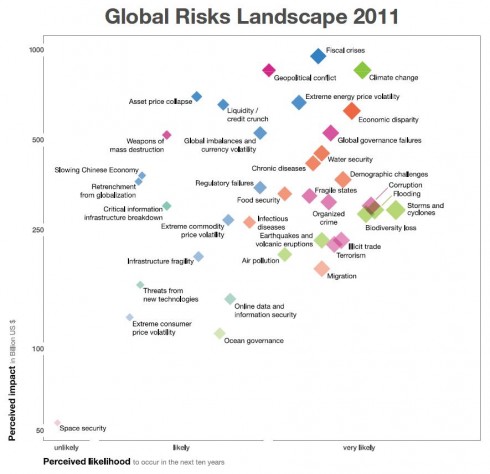
I was reading through the Executive Summary of the World Economic Forum’s Global Risks 2011 this afternoon (as you do) and the chart on page 3 (see above) caught my eye (click on it to enlarge it). In it, the authors set out all the risks they see in the world on a matrix which positions the various risks by their perceived impact on the global economy and by the perceived likelihood of their happening. What you might expect to be at the top, given recent media reports, would be the threat of terrorism or perhaps some hideous computer virus that knocks out nuclear power station. But no. There at the top, leading the pack, are climate change, ‘extreme energy price volatility’ and fiscal crises.
Read more»
 At my workshop at the Transition Network conference I tried out a new teaching tool for Transition initiatives, a deck of cards designed around the ‘Ingredients of Transition’, as set out in the forthcoming ‘The Transition Companion’. On one side of the cards is a photo that captures the spirit of the ingredient and its name, and on the other side is the problem the ingredient is a response to and the solution it represents.
At my workshop at the Transition Network conference I tried out a new teaching tool for Transition initiatives, a deck of cards designed around the ‘Ingredients of Transition’, as set out in the forthcoming ‘The Transition Companion’. On one side of the cards is a photo that captures the spirit of the ingredient and its name, and on the other side is the problem the ingredient is a response to and the solution it represents. 




